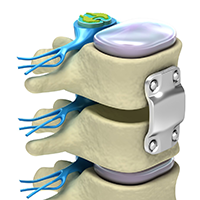First, some background: fusion surgeries of the spine are commonly performed in the USA, at a rate that is 2-3 times higher than in any other industrialized nation on Earth. Even within the USA there are extremely high regional variations on the rate of fusion surgeries. Spine surgeons seem to rarely agree on what constitute an indication for fusion surgery. Spinal surgeries in general, and fusion surgeries in particular, are very expensive (usually costing well over $100,000), and have the potential for serious (sometimes catastrophic) complications. Fusion surgeries are also associated with further degeneration of the spine, as the segments above and below the fixed segment are subjected to additional bio-mechanic stress forces. On top of all that, spinal surgeries have a relatively high rate of failures, a rate that has been reported in the medical literature to be in the 25-40% range. Failures are so common that a specific clinical term has been coined to describe those patients: Failed Back Surgery Syndrome.
Obviously, it is important to determine if spinal fusion surgery is a better long term option than non-surgical care for patients with chronic back pain and disc degeneration. The medical literature has not provided a clear answer to that question. Several small studies offered conflictive results (although most studies showed that surgery did not result in a long term advantage). But a new landmark study may have changed that. This study, which was presented at the recent annual meeting of the International Society for the Study of the Lumbar Spine in Arizona, is the largest study so far of randomized subjects examining fusion surgery for back pain and with the longest follow-up (Mannion AF et al. A comparison of spinal fusion and non-operative treatment in patients with chronic low back pain: an average 11-year follow-up of three randomized controlled trials, presented at the annual meeting, International Society for the Study of the Lumbar Spine, The Spine Journal, 2013. In press).
And what did this landmark study find? This study found that patients with chronic low back pain and disc degeneration that elected to have spinal fusion surgery did no better than those who elected non-surgical care. The authors concluded that given the increased risks of surgery, the use of lumbar spine fusion in chronic low back pain patients should not be favored where other non-surgical treatments are available.
If you suffer from chronic back pain, consider regenerative medicine as a safer alternative to surgery. Schedule a free consultation today to learn how regenerative treatment can help you manage your chronic back pain.
To learn more about non-surgical alternatives to back or joint surgeries go to: www.dontoperate.com .

